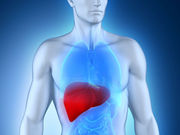Six DAA regimens show high SVR in HCV genotype 1 without cirrhosis, even with HIV co-infection
TUESDAY, March 21, 2017 (HealthDay News) — For hepatitis C virus (HCV) genotype 1 infection, multiple direct-acting antiviral (DAA) regimens show high rates of safety, tolerability, and efficacy, according to a review published online March 21 in the Annals of Internal Medicine.
Oluwaseun Falade-Nwulia, M.B.B.S., M.P.H., from the Johns Hopkins University School of Medicine in Baltimore, and colleagues conducted a systematic literature review to examine the efficacy and safety of oral DAAs for treatment of persons with chronic HCV infection. Data were included for 42 studies of controlled and single-group registered clinical trials of adults with HCV infection.
The researchers found that for patients with HCV genotype 1 infection without cirrhosis, including those with HIV co-infection, six DAA regimens showed high sustained virologic response (SVR) rates (>95 percent). Limited effective treatments were found for HCV genotype 3 infection (two DAA regimens). Compared with other populations, patients with hepatic decompensation, especially those with Child-Turcotte-Pugh class C disease, had lower SVR rates (78 to 87 percent). For certain DAA regimens and patient groups, the addition of ribavirin was associated with increased SVR rates. Low rates were seen for serious adverse events and treatment discontinuation (less than 10 percent in the general population); more mild or moderate adverse events were seen for regimens that included ribavirin versus those that did not.
“Multiple oral DAA regimens show high rates of safety, tolerability, and efficacy for treatment of HCV genotype 1 infection, particularly among persons without cirrhosis,” the authors write.
Several authors disclosed financial ties to the pharmaceutical industry.
Copyright © 2017 HealthDay. All rights reserved.








